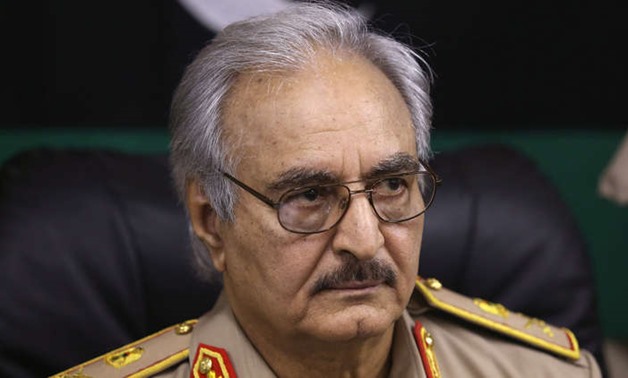
Field Marshal Khalifa Haftar, commander of the Libyan National Army / press photo
CAIRO – 4 May 2018: The General Command of the Libyan National Army (LNA) announced Thursday that its military forces are moving steadily towards liberating the port city of Derna from Islamic militias, asserting that the Libyan troops have already controlled some sites near the city.
“The Libyan National Army advanced towards the enemy's bases in Derna imposing harsh blockade on the terrorist groups,” Khalifa al-Obeidi, head of the LNA’s media office, said in a press release of which Egypt Today obtained a copy.
The spokesperson for the LNA, Ahmed al-Mismari, stated that Field Marshal Khalifa Haftar, commander of the LNA, has not yet ordered the attack on Derna, but their forces remain on standby.
Intensive clashes were erupted southern Derna between the LNA and fighters from Derna Shura Council amid heavy artillery shelling on Thursday morning.
Meanwhile, the spokesperson for the Derna Shura Council, Mohamed al-Mansouri said they were able to foil the attack and to shell locations for Haftar's forces by heavy artillery fire.
On the other hand, the International Quartet Committee on Libya held on Monday its fourth meeting at the headquarters of the Arab League in Cairo to discuss the developments in Libya since its last meeting in New York in September 2017 and reviewed the coming steps for the country’s democratic transition.
The Quartet welcomed the decision by the Libyan Supreme Court that effectively validated the decision taken by the Constitutional Drafting Assembly in July 2017, to establish a broad-based consensus among all Libyan stakeholders towards holding a constitutional referendum.
The Quartet emphasized the continued need to comprehensively address the security challenges posed by the proliferation of weapons, by armed groups outside of State authority, and by smuggling and trafficking networks. They stressed the importance of a united Libyan military operating under civilian oversight and a unified chain of command that is capable of consolidating peace and security throughout the country.
Since the ouster of Libyan long-time leader Muammar Ghaddafi more than six years ago, the war-torn country draws wide international and regional attention, causing a serious threat on the national security of North Africa and Europe.
Libya, which is struggling to get through the critical political situation that it has been experiencing since 2011, is not only trying to unify its army, but is longing to revive its political functions by conducting presidential and legislative elections.
Egypt has hosted several meetings to bring the Libyan conflicted factions to the negotiations table to resolve the Libyan crisis and amend the Skhirat agreement, which aims at ending Libya’s civil war.
The major obstacle in the face of any international or Arab participation in ending the crisis in Libya is the lack of a Libyan partner that would support any involvement. Since 2014, there are two major factions on the ground, one led by Haftar, commander of the Libyan National Army, who now controls the eastern side of Libya and works in cooperation with the government of the House of Representatives, known as the Tobruk government. The other is led by Fayez al-Sarraj, head of the UN-backed Libyan Government of National Accord.
Therefore, there is no official side recognized by all parties in Libya, but there are two opposing factions, roughly equivalent in terms of power, competing for legitimacy. Nonetheless, neither side appears to be able to tip the scales of this conflict in its favor.

Comments
Leave a Comment